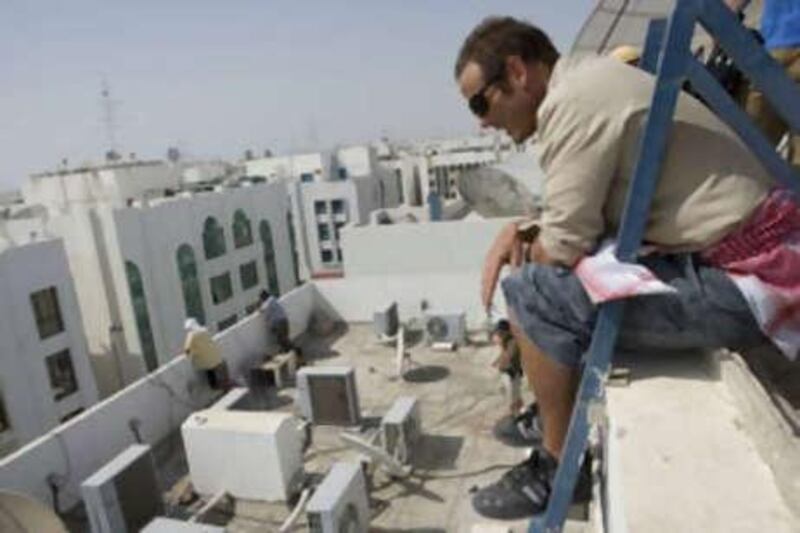A new film commission is being formed to promote the Emirates as a prime location for moviemakers, but industry insiders warn that cultural and political sensitivities could impede plans to attract major production companies to the country. Two major American feature films - Syriana and The Kingdom - were shot in the UAE's largest cities within the past four years. In both cases, however, producers had to secure special permission from the Government and, say critics, without a film commission the UAE has been missing out on access to an important industry.
The Abu Dhabi Authority for Culture and Heritage has been charged with the development of the commission, with a mandate to promote the UAE as a location, partly by developing an incentive programme to attract filmmakers. Funding will come in part from the Abu Dhabi Media Company, publisher of The National. Industry experts say the foundation of a commission will not, by itself, increase the ease with which foreign film companies can shoot here.
"For the development of culture, of an artistic community, you need film, TV, music," said Ali Jaafar, the Middle East correspondent for Variety, a film industry magazine, and occasional contributor to The National. "And Abu Dhabi and Dubai both have the potential to attract production companies." The trouble, he said, was the country's rulers "do not want anything too controversial or political", and that films set in the Middle East tended to have both qualities.
"Political dialectic doesn't go down too well in the UAE," said Mr Jaafar. "And for those people trying to attract the foreign film industry, that's frustrating." The 2005 release of the American feature film Syriana - a geopolitical thriller starring and produced by George Clooney, with scenes set in an unnamed Arab country but shot in Dubai - fell foul of the Dubai censorship office, which felt the film depicted the country poorly. When it was screened in the UAE, the film had many scenes removed, including one in which officials beat migrant workers.
When Syriana was screened here, Aleem Jumaa of the Dubai censorship office said any film that was disrespectful to the country, its President or religion, or which depicted immorality, including nudity, or promoted vices such as the use of drugs or alcohol, would not be allowed. Censorship is not the only issue that will have to be addressed by potential filmmakers coming to the UAE. Tim Smythe, managing director and executive producer of the Dubai company Filmworks, said the usual mechanisms through which countries attracted foreign production companies - including subsidies, rebates and other incentives - had yet to be put in place here.
Because the UAE's two largest cities did not have local technical expertise or the infrastructure to host production companies, foreign filmmakers would have to bring up to 60 per cent of their crews with them, Mr Smythe said. The rising cost of hotel rooms and other facilities would act as additional disincentives. The good news, he said, was the film commission was on the way. "A film board is extremely important and urgently needed," he said. "With that in place, we can look at regulating procedures and making this a more attractive place to come. Almost every country offers a rebate of 20 to 40 per cent, or another form of incentive."
In Morocco, where about 30 movies are filmed each year and where, ironically, David Lean's 1962 desert classic Lawrence of Arabia was set. Incentives include value-added-tax exemptions, assistance from the military, discount on airfares, and simplified customs procedures for film equipment. In New York, one of the world's iconic settings, the Mayor's Office of Film, Theatre and Broadcasting offers incentives and services such as free filming permits, locations and police assistance, earning the city more than US$5 billion a year.
Once incentives were in place in the Emirates, said Mr Smythe, film production in the UAE was more likely to be continuous, stimulating employment and the development of local expertise. Abdullah al Bastaki, director of the Emirates Film Competition, said the producers of the 2007 Universal Pictures film The Kingdom, a political thriller about a terrorist attack on American workers in Saudi Arabia, chose to shoot in Abu Dhabi because it resembled parts of the emirate's western neighbour.
"They wanted to show the status of the Emir, so they shot at the Emirates Palace," he said. "Lots of our buildings and neighbourhoods look similar to Saudi Arabia, and we had an open mind about that particular movie. But we still have a lot of deficiencies; we don't have a film industry." Although Mr Bastaki admitted the country was naive when it came to film production, those that were shot here had proved lucrative.
"As a movie, The Kingdom didn't do any service to anyone," he said, "but it made us a lot of money, so hey." Mr Jaafar, on the other hand, does not believe the financial argument for fostering a local film industry has merit. "They don't need the money, so the financial argument isn't compelling. But the cultural argument is indisputable," he said. "I am confident that eventually the UAE will be able to attract production companies. The question is whether it will take months or years. And that's up to the rulers."
@Email:jhume@thenational.ae





